If you have already followed the series, you might know that building a thermal efficient house is not something that is impossible. By insulating and using appropriate materials you can minimize the heating or cooling of your house enough so that the maintenance cost is kept low.

Sizing the system
In order to use everything that comes out of the system and keep the costs down you have to employ a little math. You have to choose a heat source, and properly size the radiators. To do this we will rely on the heat loss formula that we have used in the previous article.
Ht = A * U (ti - t0)
The most accurate and correct way to calculate it would be to make an excel with surfaces and their heat transfer properties. All values are in watts per square meter but they can also be calculated in imperial BTU. Don't forget to include all the different walls and surfaces in contact with the exterior to be as exact as possible.

Using the surfaces areas and the coefficients we can quickly calculate the U-value or R-value, depending on what unit you want the result in, for the whole house. In the end just add together the results of all the different surfaces' heat loss. For my loose example based on my house, let's say that it's close to 8kW, for a temperature difference of 21 degrees Celsius. That is calculated by using the above formula, which was explained in depth in the last article:
1 BTU/hr = 0.00029307107 kW
and
P(kW) = P(BTU/hr) / 3412.142
and
P(kW) = P(BTU/hr) / 3412.142
There is another way to quickly and only roughly approximate the heat loss by using the volume of the air to heat up. Summing the sizes of the spaces (length, width and height) you want to heat, and estimating the wattage for each square meter to 50 Watts for an uninsulated building, 25 Watts for medium insulation and 13 Watts for good insulation building you have:
325 (surface)* 2.75 (height of the rooms) * 15 (good insulation) = 11.6kW
Relatively close to our other estimation, but keep in mind that a lot can go wrong when using the oversimplified formula, because of the very rough approximation of the wattage used.
So, in order to properly heat the example house provided above, the heating capacity of the boiler should be greater than 10kW, and must also take into account the need for heating the water that goes through the pipes to the shower and sinks in the house. This would amount to another 4kW and then I would add a little headroom to allow for small future upgrades or modification.
Perhaps another child or a cat (cat love radiators they can "monorail" on), or perhaps climate change will decrease the winter temperatures for an extended time, we need to take this into calculation when correctly sizing our system.
In order to heat the house you will probably need to use radiators, since air convectors are not that power efficient and radiating panels have a lot of drawbacks . There are a few choices, Aluminium, Cast Iron or Steel.
Had to make a picture of the table since Steemit and Markdown tables are not getting along always

I went with the cheapest, since the advantages of a cheap solution combined with the fastest heat radiation felt better than having to wait for a radiator to heat up a room.
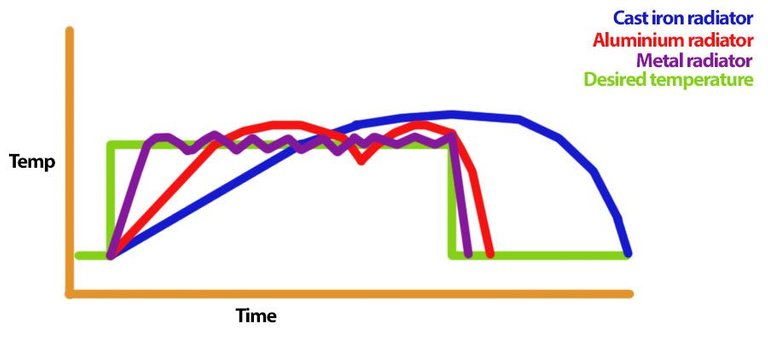
As you can see in the well designed not to scale graph, the use of a cast iron radiator is not useful when you want to quickly heat up a room and because of its mass, it retains the heat for a longer time, it means that it will heat the house long after the scheduled heating ended, while also making the top temperatures higher, since the rate of heat radiated from it is higher than the rate of the heat lost through the walls. The thermostat will stop it once the room temperature is enough but it will radiate for another hour, increasing the temperature with another one or two degrees. The regular steel radiator is able to start and stop heat radiation faster, therefore making it the most predictable for use in a home environment. The aluminium radiator has a close performance to the steel radiator, but it usually costs more.
Usable resources to use:
- Natural gas
- Heat pump
- Solar
Using natural gas
Natural gas is common in some parts of the world and it currently is one of the cheapest methods. It is not actually off the grid as you have to be connected to either the gas network or you need to have a tank on your property. I will include it here because we need to report to it for comparison.
Using natural gas for heating needs a gas boiler, a gas sensor and a couple of valves to regulate pressure and debit. These are usually done by a specialized company and the installation is also made by an authorized company. The gas boiler markets are highly specialized, and the efficiency is high.
Technically, the gas comes through the pipe, is regulated by the regulator in the first place, it heats the water or the heating fluid passing through the installation with the use of a small pump and depending on the model it has one of more parallel thermal exchangers. One for the water in the heating system and another for the house's hot water. You can connect intelligent smart controls either on the boiler, or on each of the radiators.
There are a lot of safeguards in place in the boiler but also externally, including a sensor that can cut the gas supply if gas is detected in the room.
Using a heat pump
A heat pump is basically a series of wells dug very deep in the ground, and it uses water as the medium. It is based on the fact that inside the ground the temperature rises every few meters. So in order to benefit from heating, the water is pumped deep in the ground, there it heats up and then is pumped back up through the pipes to have its heat radiated through the room radiator. A geothermal heat pump as it is sometimes called if very costly in the beginning, because of the well being dug in concordance to the energy needed to heat the house, but the operating cost is very small afterwards, due to the fact that only a small pump is used.
Electric heating
By using an electric boiler you can use electric power to heat the water or refrigerant liquid in the system. The advantage is that you can just connect the system to a photovoltaic energy production system and you get the independence from the grid. The disadvantage is that if you want to use this system with energy from the grid, than it’s many times more costly than gas. This depends a lot of the country you are in, also. The advantage of an electric boiler that heats water is that it is more energy-efficient than just having electric radiators instead of conventional radiators.
Other options
Although not having the same efficiency as electric water boilers, electric or water heated floors offer some benefits, like comfort and the fact that you only need to heat the installations to 30 degrees to be effective, and the heat is distributed more physiologically. Most of the heat is distributed at the legs, and less at the head as the warm air rises and cools by the time it reaches the head. On a conventional system, the heat radiated from the radiators is conveyed to the ceiling and less of it reaches the legs.
This being said, I have chosen to install a complementary electric floor system alongside the water radiator. I am still in the process of going off the grid, but due to the fact that Romania has rich resources of cheap gas, the cost of installing solar panels and systems was always too big when comparing to the gas systems.
So what have we found out today?
How to calculate the heating required to maintain the house warm (or cold - it goes both ways). How to choose and size a boiler, be it gas, electrical or a heat pump, as well as radiators to go along with it. That there are other options that can be used to heat up a house, more or less comfortable, depending on each person’s needs.
I am planning on building & installing a photovoltaic panel soon, and if the test is successful, I will buy and install a whole system (14kWh) using homemade panels with Chinese photovoltaic cells. Interesting times we live in, we can only dream as to what we can expect in the few years.
Are you thinking of building your own house? What is the thing holding you back? I would like to hear from you and maybe I can help you with advice, in whatever stage your are.







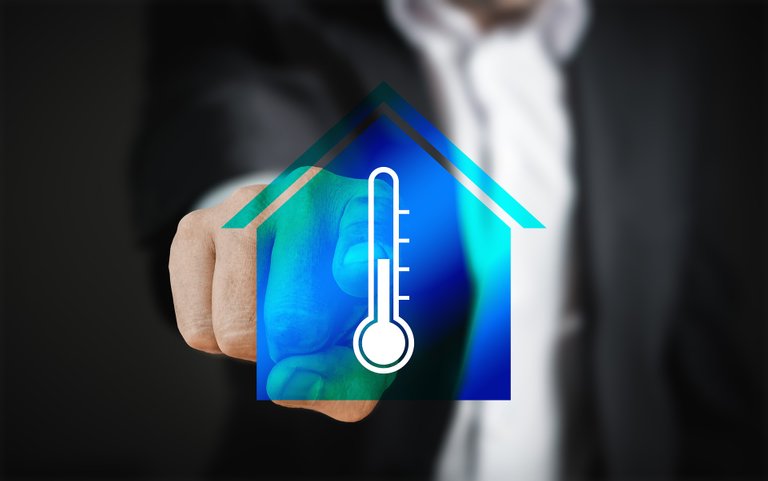

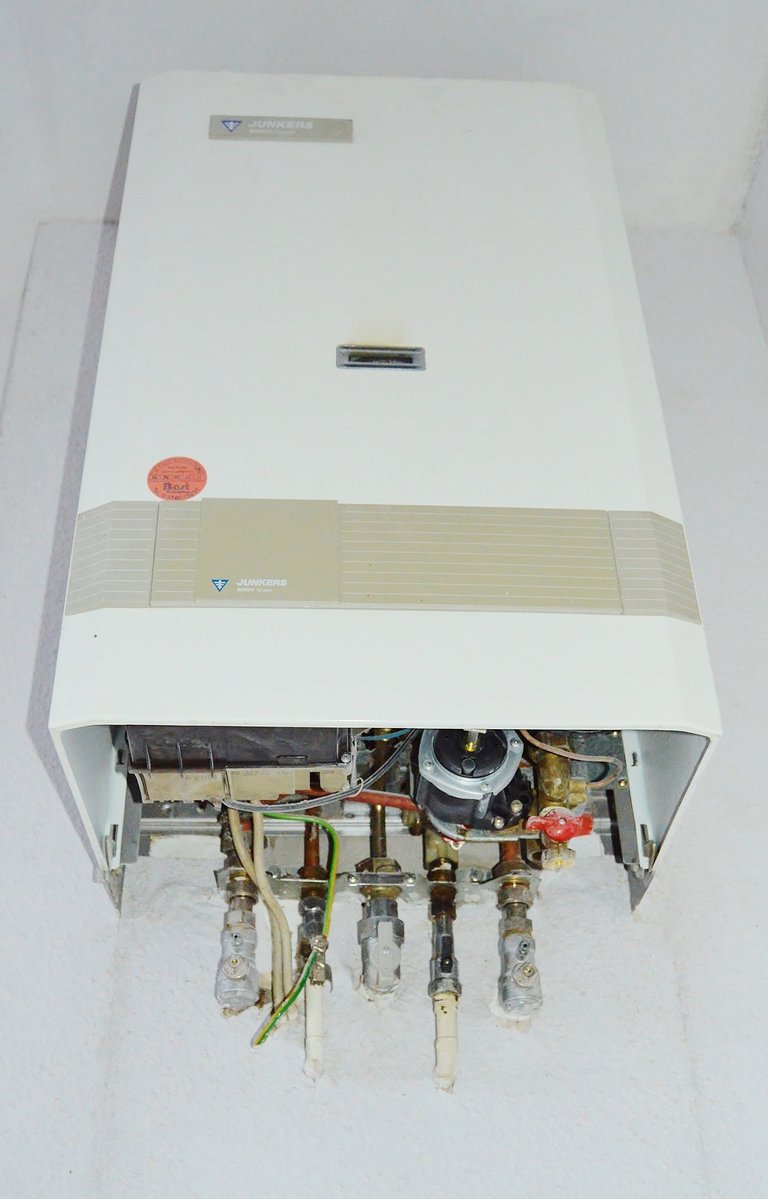
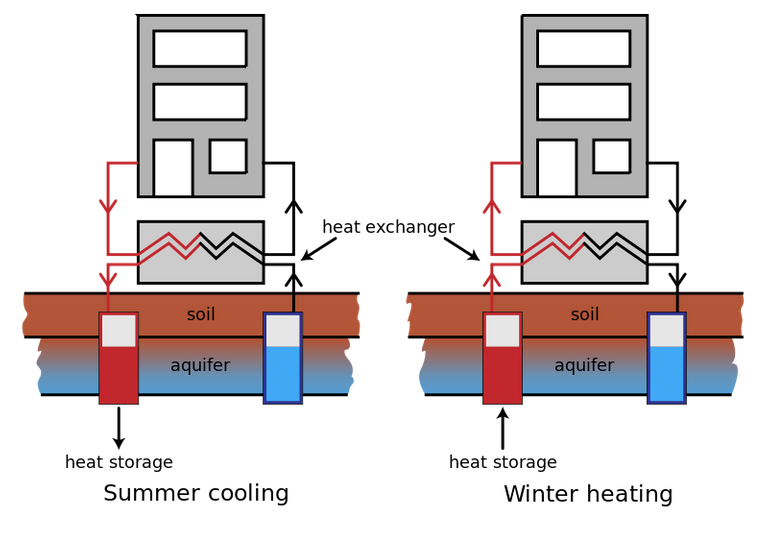
Great article, filled with a lot of useful information.
I will skip the formulas parts as usually :P.
Yes, something I am familiar with. There are many different heat pump systems. Like air-to-air, more commonly called air conditioners. Water-to-water, one of them is described by you. Water-to-soil, when you have a very long tube, grounded and in this way the heat transfer is made. The last one is what I think of, for my house, combined with an air-to-air one.
Water to soil is the cheapest system since it doesn't need to be dug very deep as long as you have a big enough surface. I have explored it a bit but for my needs I would need more than 500 square meters of area. I don't know if you can layer it multiple times on top of each other, this would reduce the surface area needed. And I don't recommend using the AC unit year round, no matter how good the inverter is.
I guess this is not applicable to those of us living in the tropical region. We have enough heat round the yea. In fact, kid it is possible to take some away :) we won't mind.
Good write-up!
:D
It is also applicable to retain cold inside. At least the heat pump, and you even have an image to show you how it is done. Pump water to the ground, it is cooled by the aquifer and then pump it back to cool your home! So I do have something for everyone!
Awesome! Then you got me :)
Exactly my thoughts too!
You have a minor misspelling in the following sentence:
It should be beginning instead of begining.Thanks, Mr.Bot! And in your language:
01010100 01101000 01100001 01101110 01101011 01110011
:D
Hello Alex, It's nice that you have taken every necessity into consideration. One can easily read through and weigh their options and then make the best decision. This is quite an awesome guide.
Here we also have a lot of Natural gas supply, but we dare not use it for heating. The temperature is moderate enough. Although some places could still utilize it, like Platuea state - I don't know if you have heard of it, its one of the coldest state in Nigeria.
About the Radiator material, you referred to "Metal". Perhaps you could clarify that as i'm sure the other two mentioned are Metals as well. It's kinda confusing.
Fixed in the article, I also had two photos which I need to fix. Thanks for bringing it up, it actually makes more sense to fix in English as informally in Romanian they are referred to as simply metal radiators. Kinda like you go to the market to buy eggs all your life but when you have to buy eggs and quail eggs.. see? :D
I have heard of the Plateau State, at least I believe it's called the Plateau, since it's on a high plateau. I have made the Nigerian aviation charts with routes and set points were higher than neccesarry, making access via some very light planes harder.
It's quite funny how our local communities name things. A lot of things here are also not called by their proper term, but many have to use such terms for better communication. Mind you, I wasn't critising you, just trying to get clarification.
About plateau, you are absolutely right. It's a very uniqe state here. But how come you make charts for Nigerian aviation?
It was really funny, I realized what I had done, I have no reason to take offense. Did you know that all the sneakers are called adidas in Romania and all copiers are called xerox, informally? The verb for copy is called "to xerox" something. It's how the communities named things that they encountered for the first time and they stuck with us.
Yeah, it is indeed very funny. There are lots of cases here too. For instance, small packs of sausage sold here are called "gala" because gala was the first brand of such packed sausages. Another one is "Macleans" a brand of toothpaste, most people (especially the illeterates) call any toothpaste Macleans.
Illiterates? I bet you called it macleans not too long!
Lol... This is nice but heating up?? Hell no! With the level of heat over here?? I don't need even an additional atom of heat.. Maybe you can write something about cooling the home later.. That'd really be nice 'cause we even experience heat in the rainy seasons over here..
As I have said before, the heat pump could be used to also cool your house by taking the excess heat and diffusing it into the aquifer, cooling it down and taking it back again.
But you are right, not everyone needs heating :P
When i was in the university, i remember a practical class we did where we had to calculate the cooling load for air-conditioning system to be fitted into a building. That had to be done in order to ensure the whole building is adequately cooled.
In my side of the world, we need more of the cooling thats why we do that. I believe the same applies to heating as cooling the inside is relative to heating the outside.
Nice one
I know :)
Cooling is also important, but in my country and in my house, you never feel the lack of cooling, or it's too little, and you would probably feel it just as a little hot. But winters on the other side...
Just like in GOT, winter is here! The
Please do not let us apply this right now... My generator is on and my fan but there us still much heat in this part of the world.. Maybe when i get to Europe i will consider this post.
You are all making me chuckle.
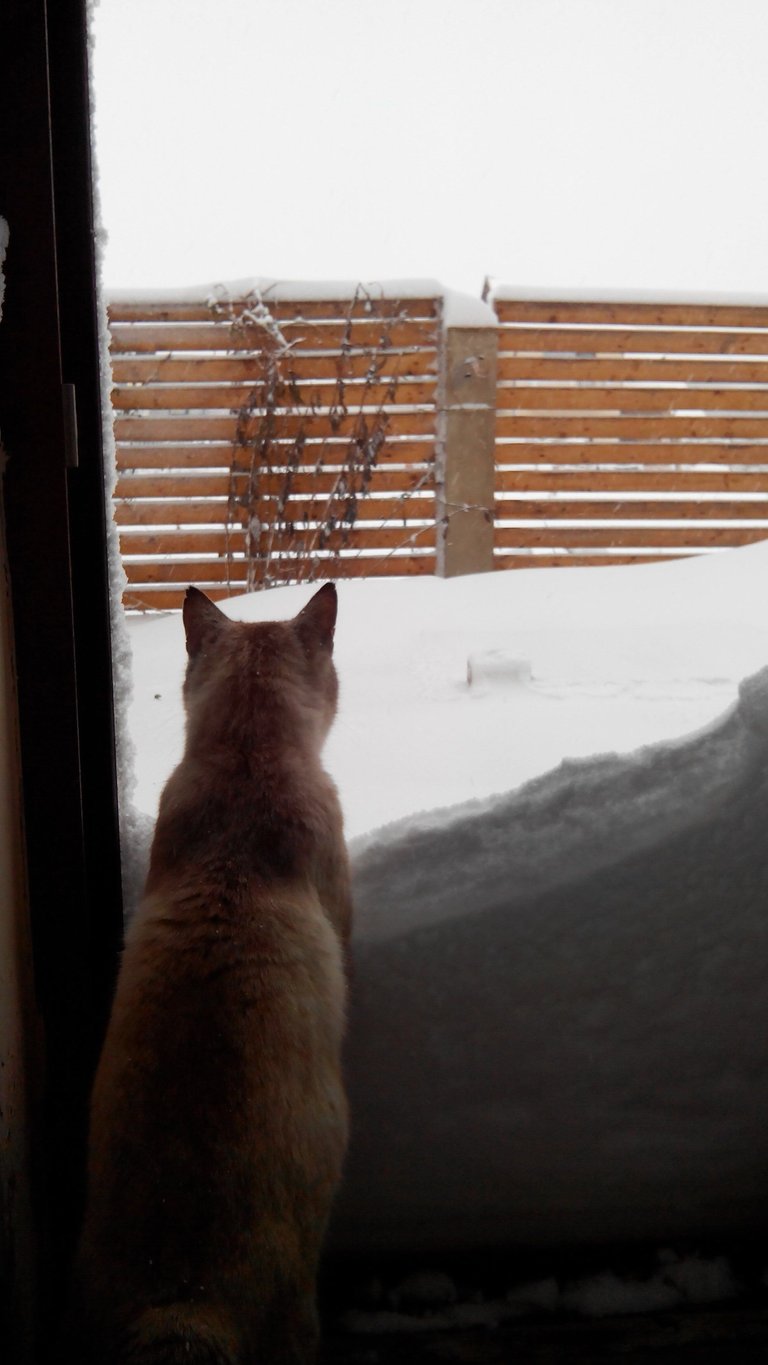
This is the winter at my back door in January:
:D
Jeez.. This must be so much cold.
Great post buddy! Great topic and it is easily understandable for those whom dont work with energy generally. Keep it going!
Greet nice post..
@alexdory